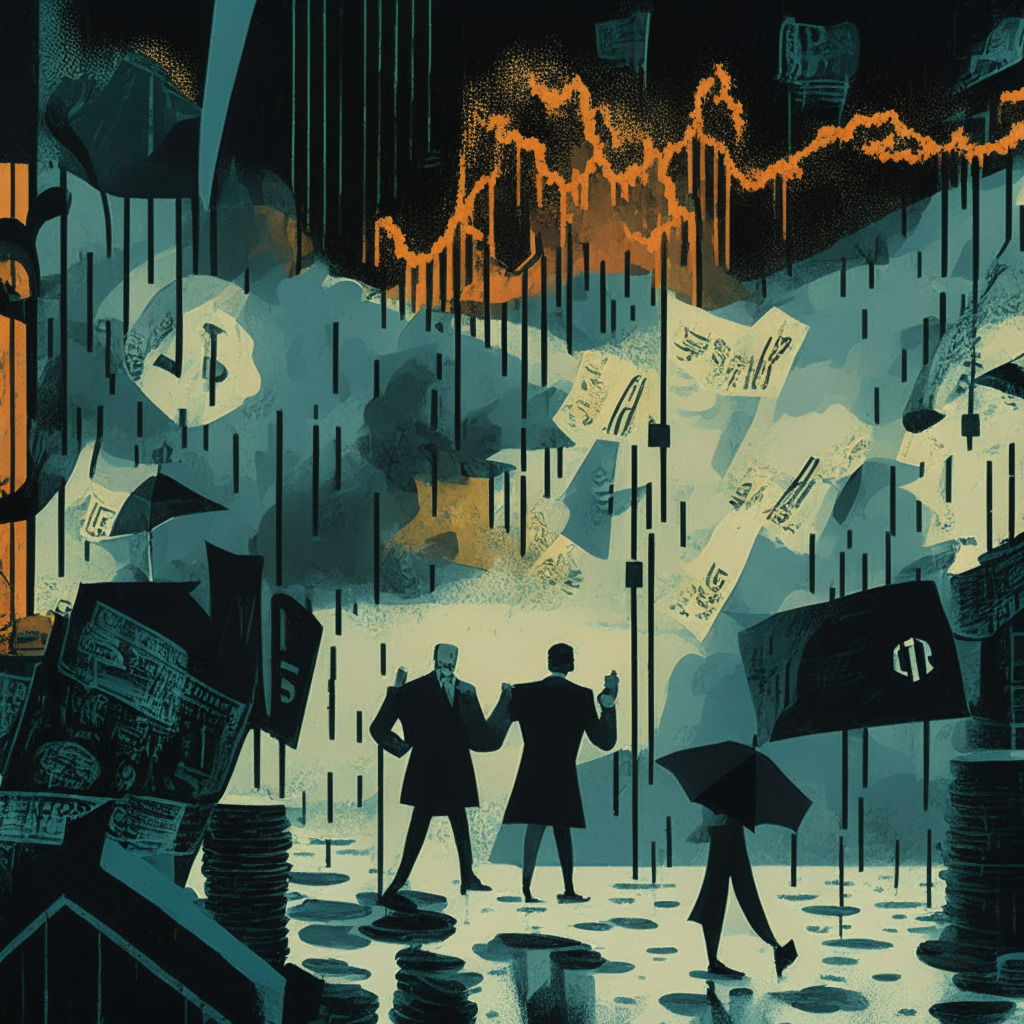Despite the closure of Algofi, a lending protocol founded on Algorand’s blockchain system, developers remain confident in Algorand’s technology. The unexpected shutdown highlights the complex dynamic between technological innovation and rigorous regulatory policy within the crypto landscape, emphasizing the unpredictability of the evolved financial system.
Search Results for: bittrex
Navigating the Crossroads: Pros and Cons of Crypto Regulation Amidst Ongoing Innovations and Concerns
“Crypto regulation remains a hot topic with structural flaws and potential benefits. The Bank for International Settlements criticizes crypto’s viability in the monetary system, while the UK Treasury suggests a five-year regulatory reprieve could benefit digital assets. However, controversies arise with technological advancements and perceived threats to decentralization principles by some pilots of Central Bank Digital Currency. Meanwhile, jurisdiction disputes in crypto markets begin.”
The SEC’s Joust with Crypto: Regulatory Overreach or Necessary Oversight?
“Paradigm’s Special Counsel Rodrigo Seira criticizes the SEC’s recent actions against secondary crypto markets and U.S.-based crypto exchange Bittrex as overstepping jurisdiction. Seira argues crypto-assets do not fall under the SEC’s purview, highlighting the need for clearer regulatory framework.”
Decoding the Cuban-Stark Showdown: SEC Regulations, Crypto Debacle, and the Japan Model
Mark Cuban and former SEC official, John Reed Stark, recently disagreed on social media over the cause of the FTX’s downfall. Cuban believes that if the US SEC had adopted regulations similar to Japan’s, US customers wouldn’t have suffered. However, Stark contends blaming SEC is unreasonable, insisting that even with robust compliance, crypto businesses like FTX wouldn’t comply.
Kraken Crypto Exchange: Facing IRS Scrutiny and the Clash of Regulation vs Decentralization
A U.S court order has demanded Kraken, a crypto exchange, to surrender a large volume of user data to the IRS for an investigation into potential tax evasion. This indicates a rise in regulatory scrutiny on crypto exchanges and challenges the balance between the need for robust regulations and preserving the decentralized nature of cryptocurrency.
Coinbase v. SEC: A Battle for Crypto Regulatory Clarity or Arm-Wrestling for Power?
Coinbase challenges the U.S. SEC stating it lacks jurisdiction to take enforcement actions against it, alleging Coinbase listed unregistered securities. Coinbase refutes this, claiming virtual currencies on its platform do not qualify as securities and it operates as a secondary market. The ongoing legal tussle underscores the need for clearer regulatory guidance in the digital asset industry.
Binance Backpedals on Delisting Privacy Coins in EU: A Balancing Act between Regulation and Innovation
Binance has reversed its decision to delist certain privacy coins within the European Union, following adjustments to comply with regional regulations. However, crypto like Monero, Beam, MobileCoin, Firo, and Horizen still face potentially being delisted. This move aligns with the EU’s modernized MiCA regulatory standards for cryptocurrency firms. As regulators seek balance, there’s concern about stifling innovation and overreaching into the privacy-focused crypto space.
Digital Asset Market Structure: A Path for Crypto Regulation or Hindrance to SEC’s Authority?
House Financial Services Committee Chair Maxine Waters proposed the Digital Asset Market Structure bill, offering US-based digital asset exchanges a pathway for SEC registration, seeking regulatory clarity for the crypto industry. The legislation aims to approve digital securities, commodities, and stablecoins for trading while providing guidelines to distinguish between crypto-based securities and commodities.
Binance’s Kazakhstan Launch: Embracing Regulation or Escaping Scrutiny?
Binance has launched a regulated cryptocurrency exchange in Kazakhstan, offering users various crypto and fiat-focused services. Amid growing regulatory troubles for Binance in the West, this move raises questions about whether established crypto players will continue seeking crypto-friendly jurisdictions or if regulatory bodies will adapt to accommodate the rapidly evolving industry.
Delisting ADA, SOL, and MATIC: Balancing Regulatory Compliance and Crypto Innovation
Bakkt Inc delists Cardano, Solana, and Polygon following their designation as investment contracts by the SEC. This move aims to ensure compliance with regulatory guidelines, but may hinder the growth potential of affected digital currencies and the broader crypto industry.
Binance.US vs SEC: Striking a Balance to Protect Customer Funds and the Crypto Market
Binance.US and the SEC are working towards a compromise to protect customer funds during the ongoing lawsuit. Both parties are considering solutions to avoid shutting down the exchange, which would impact the digital asset market significantly.
Binance & Binance.US Battle SEC Lawsuit: The Fate of Crypto Regulations and Industry
Binance and Binance.US face the SEC in court over a proposed temporary restraining order, which they claim could threaten their businesses’ survival. Meanwhile, Ripple’s ongoing SEC lawsuit offers insights into the regulator’s deliberative process. The outcomes of these cases will significantly influence the future of cryptocurrency regulations and the industry’s landscape.
SEC’s Labels Impact ALGO and FLOW: Analyzing Market Reaction and Crypto Resistance
The SEC’s decision to label several cryptocurrencies as securities resulted in historic lows for Algorand (ALGO) and Flow (FLOW) on June 10. Despite opposition from projects like Solana, Cardano, and Polygon, the crypto market thrives, but ongoing debates may create volatility for investors.
Striking Balance: Crypto Regulation vs. Consumer Protection & Innovation in a Maturing Market
The recent objection by the US Department of Justice to Bittrex’s liquidation plan highlights the complexity of cryptocurrency regulations and their impact on the industry. Balancing accountability, fairness, innovation, and consumer protection remains a significant challenge for the fast-evolving crypto sector.
SEC Chair Gensler’s Speech Impact on Crypto Compliance and Innovation Debate
SEC Chair Gary Gensler emphasized compliance and debunked the notion that utility tokens can evade securities categorization, also criticizing big players like Binance and Coinbase. He highlighted the need for substantive changes in the crypto sector to satisfy regulatory requirements, adding to the ongoing debate on balancing compliance and innovation.
SEC Chair’s Alleged Binance Connection: Uncovering Gensler’s Crypto Stance and Its Implications
Lawyers for Binance claim that current SEC Chair Gary Gensler offered his advisory services to the company in 2019, prior to becoming SEC Chair. Gensler allegedly had multiple conversations with Binance founder Changpeng Zhao and other executives. This development raises questions about Gensler’s true position on cryptocurrency and his relationship with Binance.
Robinhood Rethinks Crypto Offerings Amid SEC Actions: Balancing Regulation vs Innovation
Robinhood is reevaluating its digital asset offerings following the SEC’s actions against major crypto exchanges like Binance and Coinbase. With the SEC identifying several tokens, including popular ones like Solana, Cardano, and Polygon, as unregistered securities, the debate on cryptocurrency regulation intensifies as market participants balance regulatory clarity with the potential stifling of innovation.
SEC Crackdown on Crypto: Protecting Consumers or Stifling Innovation?
SEC Chairman Gary Gensler claims the crypto industry’s business model is “built on non-compliance” and highlights actions taken against prominent exchanges like Coinbase and Binance. Critics argue stricter regulations could hinder innovation in the largest global economy.
SEC vs. Binance: Balancing Consumer Protection and Crypto Innovation
The SEC has announced charges against Binance, alleging unregistered securities trading and violating securities laws, causing a market ripple effect. This raises concerns about future scrutiny of other cryptocurrencies while highlighting the blurred line between regulation and innovation in the crypto industry.
SEC Lawsuit Against Binance: A Warning for Coinbase and the Future of Crypto Regulation
The SEC’s lawsuit against Binance alleging unregistered securities via BNB and BUSD tokens could foreshadow similar legal action against Coinbase. Analyst Mark Palmer suggests that 37% of Coinbase’s net revenue may be at risk if SEC targets its crypto trading and staking operations.
Binance vs SEC Lawsuit: Striking the Balance Between Innovation and Regulation
The ongoing clash between Binance and the SEC underscores the need for clear regulations and collaboration in the digital asset industry. Balancing innovation with adherence to regulations is crucial for a thriving, safe, and transparent environment for all stakeholders.
Ripple Effects of FTX Collapse: Analyzing Industry and Regulatory Impacts
FTX’s collapse led to a ripple effect on crypto companies like Silvergate Bank, BlockFi, and Genesis Global Capital, debanked crypto firms, and a regulatory crackdown. Binance considers boosting compliance, while Tether plans sustainable BTC mining in Uruguay. Nvidia, Microsoft, and other tech companies advance AI technology and NFT marketplace, Tabi raises $10 million for gaming ecosystem development.
Crypto Exchanges Exit or Embrace Canada’s Regulatory Climate: Analyzing Strategies
Bybit exits the Canadian market due to recent regulatory developments, joining other exchanges like Binance, OKX, Paxos, dYdX, and Bittrex. In contrast, Coinbase, Kraken, Gemini, and Shakepay have chosen to engage with regulators and navigate the evolving crypto landscape by filing pre-registration undertakings with Canadian Securities Administrators.
Cardano Summer: Will ADA Surpass Bitcoin and Ethereum amid Regulatory Changes?
Cardano founder Charles Hoskinson envisions a bright future for the proof-of-stake blockchain platform, with potential to surpass Bitcoin and Ethereum due to upcoming updates and proposals like CIP-1694. Hoskinson also discussed metrics for decentralization and the importance of a nuanced regulatory framework in the wake of recent SEC actions against the crypto industry.
Navigating the Pathways to Global Crypto Regulation: WEF’s Recommendations & Challenges
The World Economic Forum paper, “Pathways to Crypto-Asset Regulation: A Global Approach,” emphasizes the need for global regulation, collaboration between policymakers and industry stakeholders, and addressing inconsistencies and ambiguity in the crypto market. The paper offers recommendations focusing on sharing best practices and achieving consistency in regulatory frameworks.
Strike’s El Salvador Move: Growth or US Regulatory Uncertainty Escape?
Strike establishes its international headquarters in El Salvador, highlighting the country’s friendly crypto atmosphere compared to the uncertain regulatory climate in the United States. The move showcases the importance of a favorable regulatory environment for the growth of the global crypto ecosystem.
Mark Cuban vs SEC: The Battle Over Crypto Tokens as Securities and Its Consequences
Mark Cuban criticizes the SEC’s approach to targeting crypto tokens and labeling them as securities, suggesting a decentralized finance workaround to release tokens without a treasury. However, this proposal has faced criticism as the SEC’s aggressive stance on crypto tokens raises safety concerns and sparks debate within the crypto community about the future of tokens and regulation.
Huobi Halted in Malaysia: A Sign of Global Crypto Regulatory Struggles
The Securities Commission Malaysia has ordered cryptocurrency exchange Huobi Global Limited to halt operations, as it was functioning without proper registration. This coincides with tensions between crypto exchanges and regulatory bodies like the US SEC, emphasizing the importance of exchanges adapting to evolving regulations to protect investors and ensure a secure environment for digital assets.
Centralized Exchanges’ Future: Risks, Regulation, and Decentralization Debate
The future of centralized exchanges like Hotbit and Bittrex seems uncertain amid deteriorating operating conditions, collapsing institutions, and increased regulation. As the crypto industry grapples with centralization versus decentralization, alternatives like holding one’s own crypto or trading on decentralized exchanges gain momentum. Reevaluation of existing models and exploration of options addressing operational and security concerns are essential for the crypto ecosystem’s maturity and adaptability.
Ripple-SEC Case: Setting Precedents for Crypto Regulation and the Industry’s Future
The Ripple-SEC case outcome could set a precedent for future cryptocurrency regulation and classification, impacting the crypto industry. The court’s ruling on XRP as a security or not holds implications for similar cryptocurrencies, potentially shaping companies’ operations and regulations.
Crypto Platform Collapses: Exploring Longevity, Regulations, and Investor Uncertainty
The recent liquidation of cryptocurrency platforms Voyager and Bittrex has sparked concerns about the digital finance sphere’s longevity and regulatory landscape. Investors are left uncertain as these events indicate potential risk in the future.
SEC Deems Filecoin a Security: Crypto Community Divided on Market Impact and Innovation
The US SEC has determined that Filecoin (FIL) is a security, triggering a potential debate within the crypto community regarding classification and regulatory status. As authorities continue to scrutinize digital assets, it’s vital for market participants to stay vigilant and find a balance between fostering innovation and ensuring investor protection.































